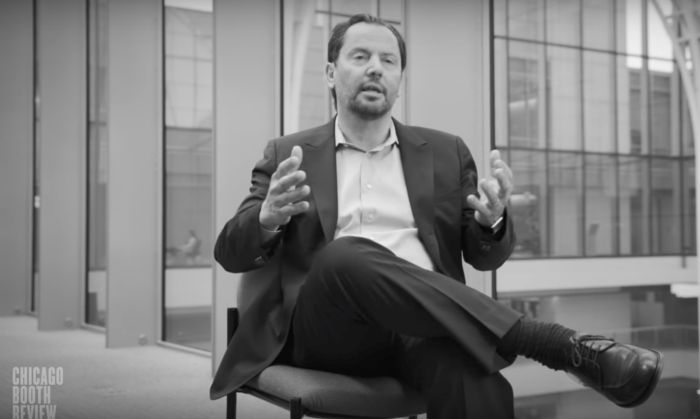A New York Times profile summarizes the work done by Luigi Zingales and the Stigler Center on regulating digital platforms and describes it as a necessary evolution in the traditional Chicago approach.

“The world has changed, and inevitably the Chicago position has to change, too,” says Professor Luigi Zingales [faculty director of the Stigler Center and one of the editors of this blog], in a long profile piece published in the New York Times. Written by Daisuke Wakabayashi, the piece surveys the work done at the Stigler Center under Zingales’s leadership and places it at the forefront of one of the crucial intellectual battles of our time: how to regulate big tech.
In what may seem like an unexpected twist in the academic history of a university famous for its pro-market approach and skepticism toward government regulation, Wakabayashi describes Zingales’s recent convocation address (which we published in full here) as “a battle cry against tech monopolies from one of the school’s leading economists.”
The Times acknowledges the increasing influence of Zingales and the research done at the Stigler Center, citing the Capitalisn’t podcast (which Zingales co-hosts with Kate Waldock) and the Center’s annual antitrust conferences, which for the past two years focused exclusively on regulating Big Tech. “Discussions at those two conferences have been echoed in recent decisions by the Justice Department and 50 state attorneys general to investigate antitrust claims against Big Tech,” Wakabayashi writes.
“My conclusions may surprise some people who identify Chicago faculty, especially the economic and financial faculty, with a certain ideology,” says Zingales, who adds that the traditional Chicago School antitrust doctrine needs to evolve given the risks associated with powerful monopolies like Google, which he describes as a potential threat to democracy.”
“The Chicago School has greased the wheels for the megamergers that have reshaped many industries while providing the intellectual justification for why today’s tech giants are not dangerous monopolies. It’s hard to argue that Google’s or Facebook’s market power is hurting prices when their products do not cost money and Amazon—while not free—is celebrated for its convenience and prices,” writes Wakabayashi, who goes on to quote Tim Wu, a law professor at Columbia University and contributing opinion writer for The New York Times: “The fact that you have prominent people at Chicago calling for antitrust enforcement is changing the game.”
Zingales, however, says he doesn’t feel like an outlier in Chicago. “Chicago faculty…abide to a method, not an ideology. It’s a method of intellectual inquiry without the blinders imposed by conventional wisdom.”
The ProMarket blog is dedicated to discussing how competition tends to be subverted by special interests. The posts represent the opinions of their writers, not necessarily those of the University of Chicago, the Booth School of Business, or its faculty. For more information, please visit ProMarket Blog Policy.






